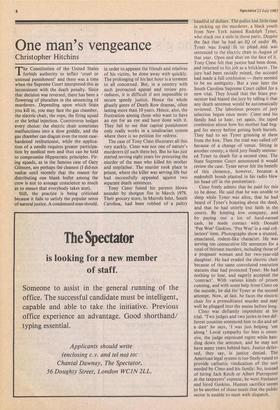One man's vengeance
Christopher Hitchins
The Constitution of the United States forbids authority to inflict 'cruel or unusual punishment' and there was a time when the Supreme Court interpreted this as inconsistent with the death penalty. Since that decision was reversed, there has been a flowering of pluralism in the sentencing of murderers. Depending upon which State you kill in, you may face the gas chamber, the electric chair, the rope, the firing squad or the lethal injection. Controversy hedges every choice: the electric chair sometimes malfunctions into a slow griddle, and the gas chamber can disgust even the most case- hardened retibutionist, while the applica- tion of a needle requires greater participa- tion by medical men and thus can be held to compromise Hippocratic principles. Fir- ing squads, as in the famous case of Gary Gilmore, are perhaps the cleanest (I did-not realise until recently that the reason for distributing one blank bullet among the crew is not to assuage conscience so much as to ensure that everybody takes aim).
Still, the practice is being criticised because it fails to satisfy the popular sense of natural justice. A condemned man should,
in order to appease the friends and relatives of his victim, be done away with quickly. The prolonging of his last hour is a torment to all concerned. But, in a country with such protracted appeal and review pro- , cedures, it is difficult if not impossible to secure speedy justice. Hence the whole ghastly genre of Death Row dramas, often lasting more than 10 years. Hence, also, the frustration among those who want to have an eye for an eye and have done with it. They fail to see that capital punishment only really works in a totalitarian system where there is no petition for redress.
The case of Tony Cimo illustrates all this very starkly. Cimo was not one of nature's murderers (if such there be). But he has just started serving eight years for procuring the murder of the man who killed his mother and stepfather. The murder took place in prison, where the killer was serving life but had successfully appealed against two separate death sentences.
Tony Cimo found his parents blown asunder by shotgun fire in March 1978. Their grocery store, in Murrels Inlet, South Carolina, had been robbed of a paltry handful of dollars. The police lost little time in picking up the murderer, a black youth from New York named Rudolph Tyner, who stuck out a mile in those parts. Despite the fact that he had an IQ of under 80, Tyner was found tit to plead and was sentenced to the electric chair in August of that year. Open and shut on the face of it. Tony Cimo felt that justice had been done, and returned to his job as a bricklayer. The jury had been racially mixed, the accused had made a full confession — there seemed to be no ambiguity. But a year later the South Carolina Supreme Court called for a new trial. They found that the State pro- secutor had biased the jury by telling it that any death sentence would be automatically reviewed. The laborious process of jury selection began once more. Cimo and his family had to hear, yet again, the taped confession about how his mother had beg- ged for mercy before getting both barrels. They had to see Tyner grinning at them from the box. Then the trial was called off because of a change of venue. Sitting in another county, a third jury finally sentenc- ed Tyner to death for a second time. The State Supreme Court announced it would review the case. Tyner never felt the benefit of this clemency, however, because a makeshift bomb planted in his radio blew his head off in the penitentiary.
Cimo freely admits that he paid for this to be done. He said that he was unable to sleep while Tyner was alive, that he had heard of Tyner's boasting about the deed, and that he had utterly lost faith in the courts. By keeping low company, and by paying out a lot of hard-earned cash, he made contact with Donald `Pee Wee' Gaskins. 'Pee Wee' is a real col- lectors' item. Photographs show a stunted, emaciated, rodent-like character. He was serving ten consecutive life sentences for a total of thirteen murders, including those of a pregnant woman and her two-year-old daughter. He had evaded the electric chair because of the same convoluted execution statutes that had protected Tyner. He had nothing to lose, and eagerly accepted the `contract'. With various kinds of prison cunning, and with some help from Cimo on the outside, he did for Tyner at the second attempt. Now, at last, he faces the electric chair for a premeditated murder and may well be plugged into the mains before long.
Cimo was defiantly impenitent at his trial. 'Two judges and two juries in two dif- ferent counties sentenced him to die and set a date' he says, 'I was just helping 'em along.' Local sympathy for him is exten- sive, the judge expressed regret while han- ding down the sentence, and he may not have many years behind bars. Justice defer- red, they say, is justice denied. The American legal system is too finely-tuned to provide cathartic vindication of the sort needed by Cimo and his family. So, instead of hiring Jack Ketch or Albert Pierrepoint at the taxpayers' expense, he went freelance and hired Gaskins. Human sacrifice seems to be another of those needs that the public sector is unable to meet with dispatch.






































 Previous page
Previous page